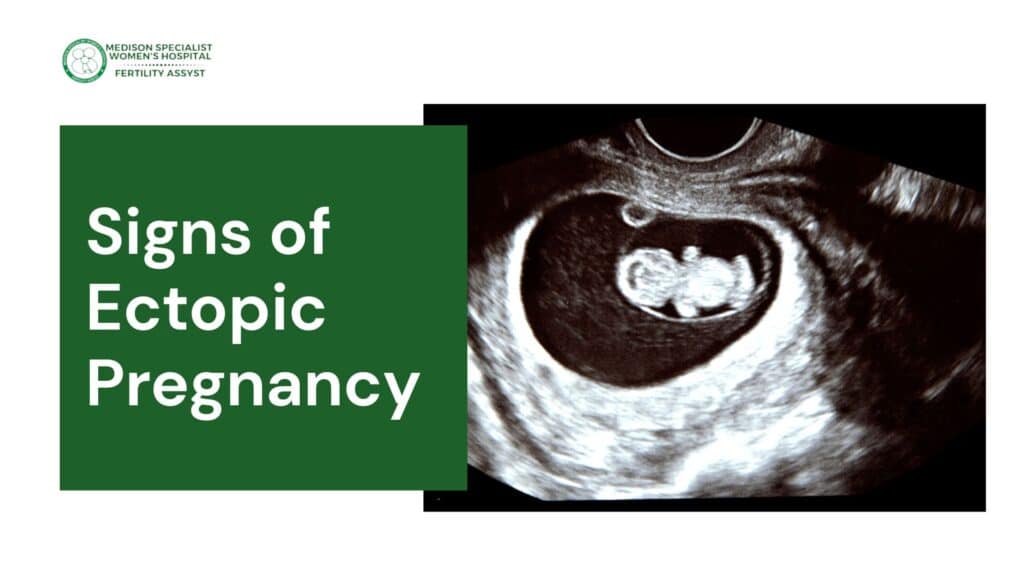Common Signs of Ectopic Pregnancy
Signs of Ectopic Pregnancy
Pregnancy is a journey filled with anticipation, but sometimes complications arise that require urgent attention. One such complication is an ectopic pregnancy, a life-threatening condition where the embryo implants outside the uterus, most often in a fallopian tube. At Medison Hospital, we prioritize your health and safety, which is why we’re sharing the critical signs of ectopic pregnancy and why early detection saves lives.

What Is an Ectopic Pregnancy?
In a healthy pregnancy, the fertilized egg attaches to the uterine lining. In an ectopic pregnancy, the egg implants elsewhere, usually in a fallopian tube (tubal pregnancy), but sometimes in the ovary, cervix, or abdominal cavity. Unfortunately, the embryo cannot survive, and the condition can cause severe internal bleeding if untreated.
Early Signs of Ectopic Pregnancy
Ectopic pregnancies often start with symptoms similar to a normal pregnancy, like a missed period or breast tenderness. However, warning signs typically appear between weeks 4 and 12. Watch for:
- Sharp, One-Sided Abdominal Pain:
- Sudden or worsening pain on one side of the pelvis or abdomen.
- May radiate to the shoulder or neck if internal bleeding irritates nerves.
- Vaginal Bleeding:
- Light to heavy bleeding that’s darker or watery (different from a regular period).
- Dizziness or Fainting:
- Caused by blood loss or ruptured fallopian tube.
- Gastrointestinal Symptoms:
- Nausea, vomiting, or diarrhea mistaken for food poisoning.
- Low Back Pain:
- Persistent ache unrelated to physical strain.
Red Flags: When to Seek Emergency Care
Go to the ER immediately if you experience:
- Sudden, severe abdominal pain.
- Rapid heartbeat, pale skin, or clamminess (signs of shock).
- Shoulder pain paired with dizziness.
Risk Factors for Ectopic Pregnancy
While any woman can experience an ectopic pregnancy, risk factors include:
- History of pelvic inflammatory disease (PID) or STIs like chlamydia.
- Previous ectopic pregnancy.
- Smoking (damages fallopian tube function).
- Endometriosis or fertility treatments like IVF.
How Is Ectopic Pregnancy Diagnosed?
- Blood Tests: Measure hCG levels. In ectopic pregnancies, hCG rises more slowly than in healthy pregnancies.
- Transvaginal Ultrasound: Checks for the embryo’s location.
- Pelvic Exam: Identifies tenderness or masses in the fallopian tubes.
Treatment Options
Early detection is critical to prevent rupture and preserve fertility. Treatments include:
- Medication (Methotrexate): Stops cell growth in early, unruptured cases.
- Laparoscopic Surgery: Removes the ectopic tissue and repairs or removes the affected fallopian tube.
- Emergency Surgery: Required for ruptured tubes to stop bleeding.
Can Ectopic Pregnancy Be Prevented?
While not always preventable, you can reduce risks by:
- Treating STIs promptly.
- Quitting smoking.
- Discussing fertility concerns with your doctor if you have a history of pelvic infections.
FAQs
Q: Can an ectopic pregnancy be saved?
A: No. The embryo cannot survive outside the uterus, and delaying treatment risks the mother’s life.
Q: Will I be able to get pregnant again?
A: Many women have healthy pregnancies later, even if one fallopian tube is removed. Fertility depends on your case.
Q: Can a pregnancy test be negative with an ectopic pregnancy?
A: Rarely. Most tests detect hCG, but levels may be lower than normal.
Ectopic pregnancies are medical emergencies, but with prompt care, most women recover fully. At Medison Hospital, our OB-GYN team is trained to diagnose and manage ectopic pregnancies swiftly and compassionately.
If you’re experiencing symptoms or have concerns, don’t wait [contact our emergency line] or visit our clinic immediately.

